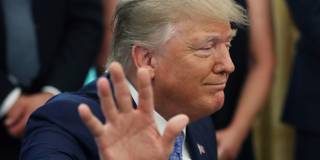Trump is often called an isolationist, but he is as interventionist as his predecessors. His strategy is simply to rely more heavily on US economic power than military might to coerce adversaries, which creates its own kind of cruelty and destabilization – and embodies its own brand of illegality.
NEW YORK – US President Donald Trump has based his foreign policy on a series of harsh economic blockades, each designed to frighten, coerce, and even starve the target country into submitting to American demands. While the practice is less violent than a military attack, and the blockade is through financial means rather than the navy, the consequences are often dire for civilian populations. As such, economic blockades by the United States should be scrutinized by the United Nations Security Council under international law and the UN Charter.

NEW YORK – US President Donald Trump has based his foreign policy on a series of harsh economic blockades, each designed to frighten, coerce, and even starve the target country into submitting to American demands. While the practice is less violent than a military attack, and the blockade is through financial means rather than the navy, the consequences are often dire for civilian populations. As such, economic blockades by the United States should be scrutinized by the United Nations Security Council under international law and the UN Charter.